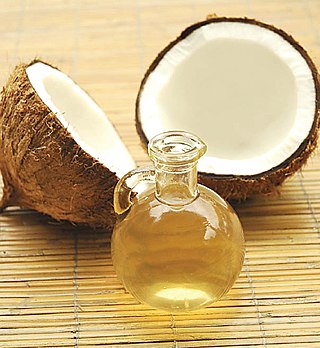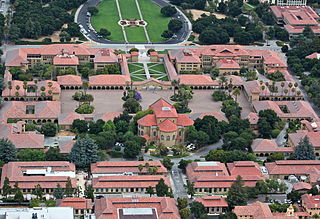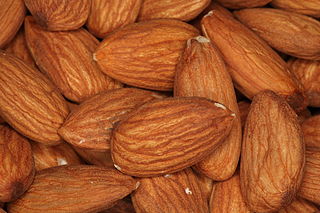Related Research Articles

The almond is a species of tree native to Iran and surrounding countries, including the Levant. The almond is also the name of the edible and widely cultivated seed of this tree. Within the genus Prunus, it is classified with the peach in the subgenus Amygdalus, distinguished from the other subgenera by corrugations on the shell (endocarp) surrounding the seed.

Davis is the most populous city in Yolo County, California. Located in the Sacramento Valley region of Northern California, the city had a population of 66,850 in 2020, not including the on-campus population of the University of California, Davis, which was over 9,400 in 2016. As of 2019, there were 38,369 students enrolled at the university.

Olive oil is a liquid fat obtained by pressing whole olives, the fruit of Olea europaea, a traditional tree crop of the Mediterranean Basin, and extracting the oil.

The olive, botanical name Olea europaea, meaning 'European olive' in Latin, is a species of small tree or shrub in the family Oleaceae, found traditionally in the Mediterranean Basin. When in shrub form, it is known as Olea europaea'Montra', dwarf olive, or little olive. The species is cultivated in all the countries of the Mediterranean, as well as in Australia, New Zealand, North and South America and South Africa. It is the type species for its genus, Olea. The tree and its fruit give their name to the Oleaceae plant family, which also includes species such as lilac, jasmine, forsythia, and the true ash tree.

The University of California (UC) is a public land-grant research university system in the U.S. state of California. The system is composed of its ten campuses at Berkeley, Davis, Irvine, Los Angeles, Merced, Riverside, San Diego, San Francisco, Santa Barbara, and Santa Cruz, along with numerous research centers and academic abroad centers. The system is the state's land-grant university. Major publications generally rank most UC campuses as being among the best universities in the world. Seven of the campuses, Berkeley, Davis, Santa Cruz, Irvine, Los Angeles, Santa Barbara, and San Diego are considered Public Ivies, making California the state with the most universities in the nation to hold the title. UC campuses have large numbers of distinguished faculty in almost every academic discipline, with UC faculty and researchers having won 71 Nobel Prizes as of 2021.

The University of California, Davis is a public land-grant research university near Davis, California. Named a Public Ivy, it is the northernmost of the ten campuses of the University of California system. The institution was first founded as an agricultural branch of the system in 1905 and became the seventh campus of the University of California in 1959.

Brea is a city in northern Orange County, California. The population as of the 2010 census was 39,282. It is 33 miles (53 km) southeast of Los Angeles. Brea is part of the Los Angeles metropolitan area.

Corning is a city in Tehama County, California, that is located about 19 miles (31 km) south of Red Bluff and about 100 miles (160 km) north of Sacramento. The population was 8,244 at the 2020 census, up from 7,663 at the 2010 census.

Coconut oil is an edible oil derived from the kernels, meat, and milk of the coconut palm fruit. Coconut oil is a white solid fat below around 25 °C (77 °F), and a clear thin liquid oil in warmer climates. Unrefined varieties have a distinct coconut aroma. It is used as a food oil, and in industrial applications for cosmetics and detergent production. Due to its high levels of saturated fat, numerous health authorities recommend limiting its consumption as a food.

Peak oil is the hypothetical point in time when the maximum rate of global oil production is reached, after which it is argued that production will begin an irreversible decline. It is related to the distinct concept of oil depletion; while global petroleum reserves are finite, the limiting factor is not whether the oil exists but whether it can be extracted economically at a given price. A secular decline in oil extraction could be caused both by depletion of accessible reserves and by reductions in demand that reduce the price relative to the cost of extraction, as might be induced to reduce carbon emissions.

Arbequina is a cultivar of olives. The fruit is highly aromatic, small, symmetrical and dark brown, with a rounded apex and a broad peduncular cavity. In Europe, it is mostly grown in Catalonia, Spain, but is also grown in Aragon and Andalusia, as well as California, Argentina, Chile, Australia and Azerbaijan. It has recently become one of the dominant olive cultivars in the world, largely under highly intensive, "super high-density" plantation.

Jane McGonigal is an American author, game designer, and researcher. McGonigal believes in the use of mobile and digital technology to channel positive attitudes and collaboration in a real-world context.

Carapelli is an Italian food company, currently owned by Deoleo, S.A, based in Tavarnelle Val di Pesa, which is a small town in the Metropolitan City of Florence, most famous for its extra virgin olive oil. The company was started as a home business in 1893 by Cesira and Costantino Carapelli. Other members of the Carapelli family joined the business and the company rapidly grew in size and popularity, to become the most modernised food company in Italy by the 1940s. Today, Carapelli Firenze SpA is the leading Italian extra virgin olive oil company where 30% of its production is exported to Europe and the Americas.

The educational system in California consists of public, NPS, and private schools in the U.S. state of California, including the public University of California, California State University, and California Community Colleges systems, private colleges and universities, and elementary, middle, and high schools.

The Bosana is the most common cultivar of olives in Sardinia. It makes up over 50% of the olive production on the island. The etymology of the name is uncertain, but it could refer to an alleged origin in the territory of Bosa. It is maintained, however, that the cultivar is of Spanish origin. It is used primarily for oil, but can also be eaten. The Bosana is a variety well adapted to less hospitable environments.

Olive oil regulation and adulteration are complex issues overseen and studied by various governmental bodies, non-governmental organizations, and private researchers across the world.

The Koroneiki is an olive cultivar from Greece primarily used in olive oil production. After the Arbequina and Arbosana, Koroneiki olives are among the most common and suitable for high density growing systems around the world. The most common variety for oil production, Koroneiki olives cover 50-60% of the acreage in Greece. Koroneiki fruits are small, but have a high quality oil yield.

Agriculture is a significant sector in California's economy, producing nearly US$50 billion in revenue in 2018. There are more than 400 commodity crops grown across California, including a significant portion of all fruits, vegetables, and nuts for the United States. In 2017, there were 77,100 unique farms and ranches in the state, operating across 25.3 million acres of land. The average farm size was 328 acres (133 ha), significantly less than the average farm size in the U.S. of 444 acres (180 ha).

Manzanilla olives ("man-zah-nee-ya") or Manzanillo, also Manzanilla de Sevilla, originally from the area of Seville, Spain, are sometimes referred to as Spanish olives but along with Arbosana, Arbequina, Cacereña, Hojiblanca, Empeltre, and Gordal there are over two hundred varieties grown in Spain as well as other areas.
References
- ↑ Ioannis Nikolaos Therios (1 January 2009), Olives, CABI, pp. 47, 122, ISBN 978-1-84593-620-4
- Ramón Aparicio-Ruiz; John Harwood (28 September 2013), Handbook of Olive Oil: Analysis and Properties, Springer Science & Business Media, p. 36, ISBN 978-1-4614-7777-8 - ↑ Super-High-Density Olive Production in California (PDF), UC Davis Olive Center, November 2009, archived from the original (PDF) on 2015-03-05, retrieved 2015-03-08
- ↑ Olea Database: Arbosana. Retrieved 10 July 2018.
